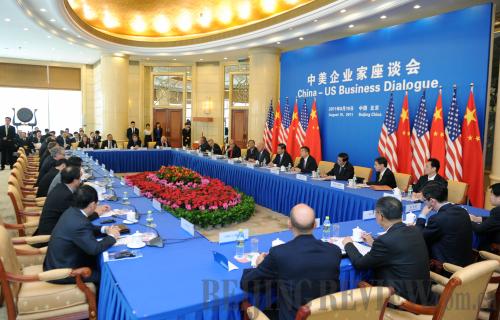|
 |
|
ENCOURAGING DIALOGUE: U.S. Vice President Joe Biden attends the China-U.S. Business Dialogue in Beijing on August 19, along with Chinese Vice President Xi Jinping (ZHANG DUO) |
"Americans own 87 percent of all our financial assets and 69 percent of all our Treasury bonds, while China owns 1 percent of our financial assets and 8 percent of our Treasury bills respectively," he said in a speech at Sichuan University in Chengdu, capital city of southwest China's Sichuan Province.
"So our interest is not just to protect Chinese investment," he added. "We have an overarching interest in protecting the investment, while the United States has never defaulted—and never will default."
On August 5, Standard & Poor's downgraded the U.S. credit rating. The agency said the "political brinkmanship" in the debate over the national debt limit had made the U.S. government's ability to manage its finances "less stable, less effective and less predictable."
"The two sides need to have a serious discussion on the impact that Standard & Poor's downgrade of the U.S. credit rating will have on the U.S. economy, Sino-U.S. trade and Sino-U.S. relations," said Qu.
"If the U.S. economy can recover from the current crisis, the Chinese economy will benefit, but if the U.S. economy depends on China buying more U.S debt to pay its development costs, the Chinese economy will suffer," he said.
China is the largest foreign holder of U.S. debt. Moreover, it is estimated that 70 percent of China's $3.2-trillion foreign reserves are dollar assets.
"Currently, there is no need to worry too much about default risks since U.S. Treasury bonds are still considered to be a good investment. But in the long term, China's assets in the United States will definitely face depreciation," said the CICIR's Yuan.
"China should attach greater importance to diversifying its foreign exchange reserves. In the meantime, it should hasten the change of its development model by shifting its focus to stimulating domestic demand," he said.
"Biden made two positive gestures during this visit: signaled that the United States is willing to transfer advanced technology to China and said the United States welcomes Chinese investment," Yuan said. "If these two positive signals come to fruition, the prospects will be encouraging."
"We welcome, encourage and see nothing but positive benefit from direct investment in the United States from Chinese businesses and Chinese entities. It means jobs," Biden said at the China-U.S. Business Dialogue in Beijing.
If the United States opens its door to Chinese investment, China's dollar assets can be transferred to capital and investment. In this way, China can change from purchasing U.S. Treasury bonds to making direct investments in the United States, said Yuan.
"China can also use its dollar assets to buy hi-tech equipment from the United States," he added.
Understanding
During the visit, Biden, accompanied by his Chinese counterpart, Xi, also traveled to Dujiangyan near Chengdu. Biden saw the progress of reconstruction work following the devastating earthquake in 2008.
"China's industries are moving from its industrialized east to its previously underdeveloped west," Yuan said. "West China will be a future destination for U.S. investment."
"Biden's visit to Sichuan will help him develop a well-rounded understanding of the country," Qu said.
"Increasing understanding and mutual trust is a long-term process," said Bonnie S. Glaser, a senior fellow with the Center for Strategic and International Studies in Washington, D.C. "Both the U.S. and Chinese governments are committed to increasing understanding and trust, and recognize that it will require hard work and mutual efforts. Vice President Biden's visit to China contributed to that larger objective."
"At the same time, it must be recognized that the relationship has problems and that the United States and China don't share common interests on every issue," she said. "Frequent high level visits and communication can help to manage areas where we have differences and even conflicts of interest."
Xi's planned visit to the United States this year would provide another opportunity to enhance mutual understanding, she said.
"We won't know how Vice President Biden's trip affected bilateral relations until we see the more important visit back to the United States by Vice President Xi," said Derek Scissors, a research fellow with the Heritage Foundation, a Washington, D.C.-based think tank.
(With reporting by Chen Wen in New York City) | 